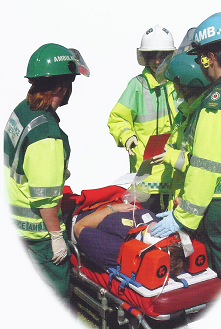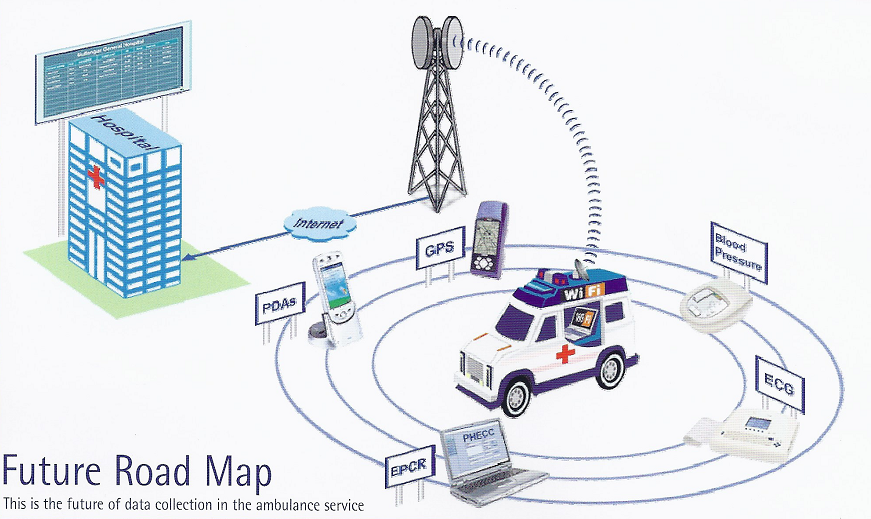PCR Implementation
The implementation of the national PCR commenced in July 2005 in the following areas;

- HSE Southern
- HSE Mid Western
- HSE Western
- HSE North Western
- HIE Midland
- Dublin Fire Brigade (OFB)
Training Aids
- Patient Care Report Guide Book
- Patient Care Report Guide DVD
The guidebook and DVD were especially designed to provide information necessary to fully understand the Patient Care Report. They set out the principles and standards as well as step by step instructions for completion.
Thank You
We would like to acknowledge the hard work and commitment of all involved in the training and implementation of the PCR, particularly the Key Trainers in each of the areas and DFB who were dedicated to the project throughout. The development of the PCR involved extensive consultation with all pre-hospital emergency care practitioners and without your feedback the project could not continue.
Feedback
Any PCR feedback will be gratefully appreciated by us. You can post to Jacqueline Egan at Pre-Hospital Emergency Care Council, Abbey Moat House, Naas, Co. Kildare or bye-mail to;
jacqueline@phecc.ie
What next?
Scanning of PCR
PHECC are in th process of drafting a tender for the scanning of the patient care report and extracting the data which will feed into the development of the Services Gateway reporting functionality. Also in parallel fashion the HSE Western area are trialing the adaption of their scanning process to the PHECC PCR.
Implementation of Electronic CPR and Services Gateway
In 2003 PHECC were involved in a research and development project which involved the development of an electronic Patient Care Report 'proof of concept'. Following positive evaluation of the proof of concept, a tender was awarded for the provision of a PHECC Services Gateway, central to which is the ePCR. This is a portal which will deliver valuablc, highly reliable, on line services for all users and stakeholders. The portal will primarily expand the value and efficiency of the PHECC ePCR within Ambulance Services in Ireland and will facilitate the secure interaction with other national healthcare systems. The portal will also comprise of reporting functionality which will allow real time extraction of anonymised data for reporting purposes. It will also involve the compilation of standard reports real time or on a predefined schedule, with viewing of reports over a web browser window in the Services Gateway according to user accessibility rights.
The portal will also assist in unlocking efficiencies and increased service provision by PHECC, including administration of the Examinations, Register and Continuous Professional Development (CPD). The core of this project will be delivered this year. |
|
ePCR Trials
PHECC have just completed ePCR pilot trials in the HSE Southern Area and HSE Mid Western Area and an ePCR pilot trial is ongoing in the HSE Western Area. The objectives of the trials were to measure the ease of data entry and capture suitability and effectiveness of the PHECC system, and printing of a report in the Emergency Department
To this end PHECC visited all Emergency Departments and met with staff. Their awareness, support and enthusiasm for the ePCR Project overwhelmed us. As we are all aware Emergency Departments are extremely constrained for space, but in each hospital visited, a printer space was identified or preidentified prior to arrival. In UCHG staff are currently scanning the PCR with the Emergency Department record, this surprised and delighted us.
All pilot trial feed back received from the EMT/Paramedics, has been collated and is contributing to the development of the next release of the PHECC system in February 2006.
Later this month, pilot testing of the ePCR will commence in the HSE Midlands area. The objective of this trial is to test bulk communications, including Wireless ambulance transfer of data to Emergency Departments, look-up triage screen in Emergency Departments and the transmission of data to the host server,for future analysis. In tandem with the next release of the ePCR, a PHECC training system willbe available in each ambulance station for EMT/Paramedic familiarisation
|
